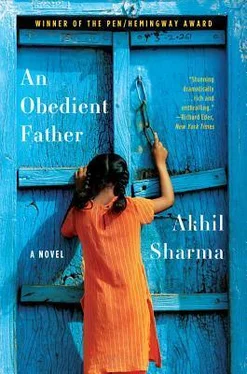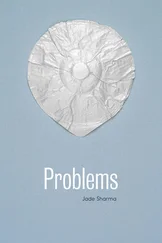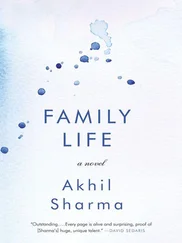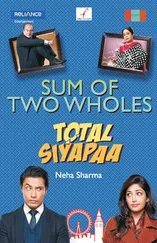We went to a long, rectangular room in the back of the house. It was dark because of the drawn curtains. Excess furniture from all over the house had been placed there. In a corner were chairs arranged in layers of semicircles. Along a wall were two sofas with two more stacked on top, and beside these were several armoires. My stomach had tightened from wondering what Ajay intended.
Ajay took out a bottle of whiskey and two glasses from a cupboard. We said cheers and downed the liquor. To get Ajay to give me more, I said, "Delicious." He smiled and poured. Ajay's solicitousness reminded me of businessmen I had dealt with who had tried to get me drunk.
"Show me the shawl."
I wanted to make him struggle for everything and pretended not to have heard him. I sat down with the shawl in its bag draped over one thigh. "Have some whiskey." I suggested this because I thought he wanted the advantage of being sober in whatever maneuver he was about to try. "Don't give me whiskey if you're not going to drink." Ajay drank a second peg. I extended my glass, and Ajay poured it more than half full. "Delicious." I swallowed the drink quickly, nervous and eager to do this before my good sense intervened. I began feeling drunk and relieved. The muscles along the back of my legs relaxed, and I stretched them.
He sighed with pleasure as I finished the drink. "How much do you think the shawl cost?"
"A lot," I said. I smiled and waited for him to reveal himself
Ajay smiled back. He was quiet for a little while. "Want more?" he asked finally. I shook my head from side to side and smiled.
"You have some. I've had three," I replied, and stared at him till he drank.
"Pavan would like a shawl like that. How much do you think it was?"
Now I understood that he wanted to buy the shawl at a cheap price from me. "Maybe fifteen thousand."
Ajay's face became serious at hearing the large amount. "Do you want to sell it? Not for fifteen thousand. Three thousand I have right now. I could pay that in five minutes."
"I'm going to give it to my daughter," I answered.
Ajay looked angry.
The bright light of the veranda staggered me. The noise of the servants and the arriving guests was a roar. I had been so unhappy that the relief from the alcohol delighted me. The BJP was not per-
feet, but I would be so good that over the years my sins would be chipped away.
A fire was lit in the center of the veranda. Mr. Gupta stepped out dressed in a new silk kurta pajama, looked around, shook hands with everyone in reach, and went back into the house. Ajay said we should go to the gateway and greet the guests. Mr. Tuli joined us and we walked out together.
The two elephants were standing on either side of the gate. They were almost completely covered with multicolored chalk drawings of religious and historical events and figures. One entire side of an elephant was taken up by Krishna preaching the Gita to Arjun the morning before battle. Another side had a map of India. Along some of the legs were individual figures. Subhas Chandra Bose, who had been forced out of the Congress presidency by Mahatma Gandhi because he was willing to use violence, wore a yellow turban. Bhagat Singh was slightly blue, and the stick of dynamite he held was very red. Shivaji, who looked very much like the TV actor who portrayed him in the serial, took up another leg. Rana Pratap, atop the leaping Chetak, appeared to be climbing the elephant. Next to and between the elephants stood the boys who had brought them. They now wore shiny gold kurta pajamas and turbans, but still carried their spears. Periodically the elephants would shift and the boys would jab them back into position.
There were already a dozen cars, mostly white Ambassador sedans, pulled up along the park fence, but more kept coming. Ajay was the first person to greet people. He had his hands pressed in a namaste. Then I said namaste and then Mr. Tuli. Ajay's voice was slurred. Afraid that mine might be also, I didn't start conversations.
While we stood in line, Mr. Tuli asked, "You live in the Old Vegetable Market?"
"Yes."
"You should thank me, then."
"Thank you," I said.
Mr. Tuli laughed. Making him laugh, maintaining my deception, imagining being rich and good, all made me feel potent.
"The Old Vegetable Market used to be all Muslim," Mr. Tuli said. "After the partition, I was one of the people sent to punish the Muslims. Pakistan had just sent a train full of Hindu bodies from Islamabad. All along the outside of the compartments they had written Go to India^ Hindu. We were told to send them a train. We put two thousand bodies in one train. I had to go back to the office to get more bullets. Nehruji knew what we were doing. We would have cleared Chandni Chowk, too, but Nehruji got frightened and said, 'Enough.' After that there were no more trains." I had heard many people make claims like these, and most I had not believed, thinking they were just attempts to impress. Mr. Tuli, perhaps because of the unusualness of his white hair combined with his youthfulness, appeared to be the type of man who might actually have done what he claimed. "We had a parade of naked Muslim girls from the Old Clock Tower to the train station. There was a band." All these stories were familiar. Mr. Tuli read dismay on my face, for he said, "The BJP is about politics and Parliament seats." One of the elephants lurched forward and was prodded back. "You don't believe me."
"I believe you."
Mr. Tuli took out his wallet and showed me what looked like a business card. It was an unevenly scissored rectangle of cardboard. He placed it in my hand. Printed on it in blue ink was a partial list of prices for copper wires. Mr. Tuli turned the card in my hand. The other side had a name and address rubber-stamped on it and a handwritten date: Gopal Godse. Savarkar Bhavan. ^00/2-A, Shaniwar Peth. My fingers twitched. "I've stayed at his flat in Pune." Gopal Godse had served eighteen years in jail for conspiring to assassinate Mahatma Gandhi. "When I left Pune, he and his wife came to the train station with a bag of guavas. His wife started an engineering company while he was in jail." He put the card in his wallet.
The prayer started, and we went back onto the veranda. The presence of history had given me a sense of scale, and I felt myself shrinking. The ceremony went on for an hour and a half Sitting behind Mr. Gupta with my drunkenness evaporating, I became colder, and self-disgust began to bead inside me. To have imagined I
could use the BJP to make up for my other wrongs was the same as believing that if I did not admit my evils, they would not exist.
The prayers were the same as most others, coins and rice were thrown into the fire, water from the Ganges was carefully spooned out, saffron threads were tied around wrists. At the end came the only unusual thing. The pundit presented Mr. Gupta with a bow and arrow. He then gave me one. I imagined the bows were to identify us with Advani, who was making appearances with bow and arrow in hand because of the BJP's support of tearing down Babri mosque, the supposed birthplace of God Ram. The bows were supple polished wood and their strings were saffron. Later, after the photographs had been taken, when I pulled back my bowstring, I found a black dash in the string, a slight split, which, when stretched, formed an O and rose naturally to my eye. Mr. Tuli told me this was called a peep sight.
During the reception after the prayers, Mr. Gupta wandered about with his bow, having his photo taken with whoever wanted it. Mr. Maurya came for the reception on crutches and I saw him enter the house with several BJP men. Mr. Bajwa also came, but only Ajay greeted him. To have my hands free for eating, I put my bow in a side room, under some sheets that were beneath a table. I ate without hunger. When I was ready to leave, I could not find my bow. I knew immediately that Ajay had stolen it. The foolishness of this made me sad. I was relieved I had never let the shawl out of my reach.
Читать дальше












